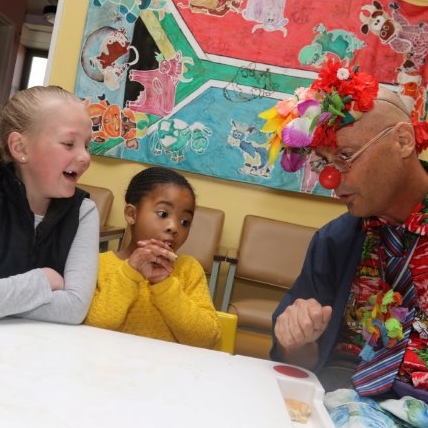click to dowload our latest edition
CLICK HERE TO SUBSCRIBE TO OUR NEWSLETTER


Published
6 years agoon
By
adminNICOLA MILTZ
Raviv has spent the past 23 years turning illness, pain, and suffering into a laughing matter.
Laughter and humour make for the best medicine when faced with life-threatening and often incurable diseases, he told the SA Jewish Report this week. He is often seen doing his rounds in the paediatric and adult oncology wards, wheeling the heart-rate monitor trolley around loudly announcing himself with the words, “Duty free, duty free, anyone for cigarettes and chocolate?”
Dressed in his trademark clown outfits complete with his favourite guitar, wigs, red noses, skirts and funny hats, he brings a smile to the faces of patients hooked up to an IV undergoing chemotherapy treatment.
“Research has shown the healing power of humour,” he said, and there is a movement to integrate medical clowning into the formal framework of hospital treatment.
The Israeli-based practitioner is in South Africa to share his knowledge and expertise in medical clowning – which does not formally exist in South Africa – and to promote his book, Medical Clowning: The Healing Performance.
He is holding training workshops and assisting Johannesburg-based clown carer, Adi Shachar, with her recently established nongovernmental organisation, Dr HeartBeat.
Shachar said Dr HeartBeat intended to pioneer the profession of medical clowning in South Africa.
Together with Raviv, she is partnering with businesses, civil society, and the government to turn the skill of medical clowning into a profession in South Africa. “Our aim is to create job opportunities in medical clowning, and in so doing, use these professional skills to work in various hospitals with the youth.”
Raviv comes across as a regular guy dressed in trendy jeans and a T-shirt. Little gives his profession away other than a fashionable pair of glasses that have both a round and square frame. He is quite shy and humble, but put him in a hospital ward, and the carnival comes out.
He came to medical clowning by default, he said.
He was a street performer in Amsterdam, doing juggling acts, odd theatre jobs, singing, and acting, when the news reached him that his beloved mother back home had breast cancer. He immediately returned to Israel to be by her side every step of her journey to health.
It was during this time that he began to see the healing power of humour and entertainment.
“Making people laugh empowers patients and their families, and gives them the strength they need to cope with the worst situations. It significantly reduces anxiety and pain.”
In a “cold and unfriendly” hospital environment, “people walk on egg shells trying not to say anything uncomfortable”, Raviv said. Then, the medical clown arrives, and allows people to vent their feelings, to say, “Ok, we are here… so let’s let it out, let’s talk about the elephant in the room… let’s laugh about it.”
Raviv studied theatre and drama therapy at the University of Haifa. He is currently a lecturer in drama therapy at Ben Gurion University Medical School and Tel Hai Academic College in Israel. He has taught drama therapy and medical clowning at numerous Israeli universities.
Raviv has been a part of the non-profit organisation, Dream Doctors, for many years, and works as a medical clown at Tel Hashomer Hospital; the Rabin Medical Center-Beilinson Campus, Petah Tikva; and Harzfeld Geriatric Medical Center in Gedera. He is currently pioneering a Master’s degree programme in drama therapy and medical clowning in the Drama Therapy Department of Tel Hai Academic College.
When asked how he copes with seeing patients in pain, distress or worse, and with becoming close to patients who pass away, he said: “I am significant in those moments. It is meaningful to be by the side of a patient in the last stages of life when they are at their most vulnerable. The job fills me.”
The joy he experiences when patients recover is “indescribable”.
“I feel so inspired by people’s resilience, the human spirit is uplifting.”
His job brings him into contact with people from all walks of life. “Outside hospital, we all play different roles – either a business person, a mother, a politician, a lawyer. Inside hospital, everyone is equal, we are all just people. The clown brings these different people together.
“It takes a special type of person to become a medical clown. I look for someone with emotional intelligence and empathy. They must be attentive and caring, while at the same time have performance skills, including being able to sing, dance, do comedy, music, and drama.
“A clown needs to be able to improvise, and create a rapport with a patient going through a difficult time.”
His greatest joy is when a patient has recovered, and has no sign of cancer in their body. A few weeks ago, Raviv took one of his favourite elderly patients to the beach in Herzlia, where they performed a wellness ritual, a celebratory dance on the shore line. “I threw plastic crabs – the symbol of cancer – into the sea, and we danced with joy,” he said.
Raviv said he felt privileged to lay the foundations of medical clowning for the academic and medical establishment in South Africa.
Raviv will hold talks with doctors, students, and those in the public sphere that can assist and train medical clowns who will work in hospitals.

Freda Neimann
Sep 22, 2018 at 2:44 pm
‘Yishar Koach.
If there is anyone in Johannesburg who is going to do this wonderful job, I have a very funny dancing flower toy which I would love to pass on. ‘